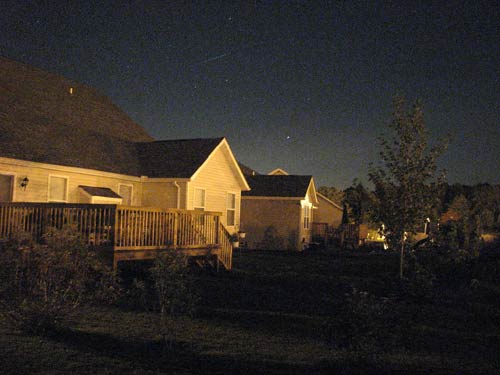一個星光閃耀的夜晚,我和病友埃里克躺在戶外,仰望星空。當流星出現時,我們興奮不已,并許下無數愿望。人的一生有許多簡單的幸福,甚至奇跡的出現。所有這些美好的時刻都值得我們永遠銘記。

By John McLeod
卓言 選 初萍 譯
|
Princess Margaret Rose Hospital For Crippled Children, Edinburgh. June, 1956. We had spent all of that splendid summer day out of doors on the veranda[1] of Hut 1, high on the hill overlooking the rest of the hospital. In the late afternoon my friend Eric and I had asked if we might sleep out under the stars and had been granted permission by the ward Sister, a stern looking, but kindly lady of, to our eyes, uncertain age. We ate our evening meal, a light supper of cold cuts[2] and salad, just right for the end of a hot day. As the sun neared its setting and the fading light became a soft purpling where horizon met sky, we settled down, with no need of words, listening to the quietening sounds of day. On the roof above us a thrush sang its hymn of evensong, sweetly registering[3] its joy at being alive. We did not disturb its caroling with any words but lay enjoying our own oasis of peace. As the twilight deepened, the night-staff brought extra blankets and hot-water bottles to keep us warm and large welcoming mugs of cocoa. In the gathering darkness we talked in quiet tones, somehow wary of disturbing the hush of evening. The lateness of the hour brought its own feeling of magic and though the day had been a long one, beginning for us around 5:30am, we did not allow sleep to intrude[4] and “steal” one minute of our “great adventure”. Instead we spoke of space-travel, of the science-fiction world of the fifties, of “Journey Into Space” (a radio serial of the time) and “Dan Dare, Pilot of the Future”, a heroic figure found within the pages of “The Eagle” comic and on radio. We pondered, as so many did then and since, on the vastness of the Universe asking the age-old questions, the “who”, “when” and “why” of that most puzzling of cosmic conundrums[5]. Being but children we, somehow, expected an answer to the unanswerable, an explanation that was within our understanding, anchoring[6] firmly our belief system, justifying our place in the scheme of things. Looking back now, I can recognize so well the delightful safety net of childhood’s naivety and the belief that all could be explained somehow, somewhere. We lost ourselves in the night sky sparkling with pinpricks of dancing light and sought out the few constellations[7] we could readily recognize, the “Great and Little Bears”, with Polaris, the “Pole Star”, ever guiding the men of the sea for many centuries past. We knew so little of our galaxy, “The Milky Way”, but our fertile, ever questing imagination ran to its limitations and to an abstract beyondness. It must have been close to midnight when the first shooting stars appeared, arcing across a night sky already garlanded[8] with twinkling jewels of light. The sudden, brief incandescence[9] of their trails, was I remember, a thrilling, wonder-filled experience, bringing gasps[10] of delight from both of us. We made countless wishes for health and wealth and happy days, for timeless moments like this, and for lives that we hoped would be rich with such unforgettable experiences. After what seemed an age the “cosmic light show” faded and once more we lay in quiet companionship under the vaulted canopy of the night sky. Sleep gradually claimed us and brought gentle, restful dreams. Waking to the dawn chorus was an especial joy as night faded and the sky grew light heralding a brand new day. The morning sunlight, I recall, had a splendor I shall never forget, its golden light full of beauty and promise, offering yet another day. Life holds so many simple blessings, each day bringing its own individual wonder, our memories storing the treasure of such moments to be drawn upon in lesser days. I was so well blessed to know Eric, a friendship made through spending so many years as ward-mates dealing with our own individual experience of long-term illness. He was an unforgettable character whom I was privileged to know, remembered fondly now, down all the days, as bright as any of those splendid shooting stars seen on that long ago, but so memorable, starlit night! |
愛丁堡瑪格麗特?羅斯公主殘疾兒童醫院,1956年6月。 那個美妙的夏日,我們一直待在1號小屋外面的游廊上,小屋位于高高的山上,可以俯瞰醫院的其他地方。傍晚時分,我和朋友埃里克問,可不可以到外面的星空下過夜,病房護士長答應了。她外表嚴厲,其實是個好心的女士,看不出有多大年紀。晚飯,我們隨便吃了點冷肉片和色拉作晚飯,在一個大熱天的傍晚吃這些清淡點的正合適。夕陽西斜,天地相接的地方,漸暗的光線變成柔和的紫色。這時我們舒服地躺了下來,無需任何言語,只消聆聽萬籟漸靜的聲響。上方的屋頂上,一只畫眉正吟唱著自己的晚禱頌歌,甜美的歌聲流露出它對活著的喜悅。我們沒有出聲,不想打擾到它快樂的歌唱,只是躺著,享受屬于自己的寧靜“綠洲”。 暮色漸深,夜班工作人員拿來了更多的毯子和熱水瓶給我們保暖,還端來了幾大杯可可茶,來得正是時候。在漸濃的夜色中,我們輕聲交談著,唯恐打破了這夜的寂靜。夜已深,卻也讓人感到神奇。盡管白天對我們來說很漫長,大概從早上五點半鐘就開始了,但我們并未允許睡意入侵,從我們“神奇的冒險旅程”中“竊取”哪怕一分鐘的時間。相反,我們談論著太空旅行、20世紀50年代的科幻世界、“太空之旅”(當時電臺的一個連播節目)以及“大膽阿丹:未來宇航員”——一個出現在連環漫畫冊《鷹》以及電臺節目中的英雄人物。 和同時代以及后來許多人一樣,我們思索宇宙的浩瀚,問古老的問題——有關宇宙的起源的“誰”、“何時”以及“為什么”,這可是所有宇宙難題中最令人困惑和費解的。盡管我們還是孩子,在這個無法回答的問題上,我們卻期待獲得一個答案,一個可以理解的解釋,能讓我們牢固樹立起自己的信仰體系,證明我們在事物發展過程中的位置正確且合理。如今,回首過去,我能清楚地看出兒童時代的天真爛漫就像一張安全網,讓我們快樂,并認為一切事情都能在某個地方得到某種解釋。 夜空一閃一閃,掛滿了起舞的光點,我們沉浸其中,找到了能馬上認出的為數不多的幾個星座——“大熊和小熊星座”,以及在過去數個世紀中一直為航海家們指引方向的北極星。盡管對自己所在的星系“銀河系”還知之甚少,我們的想象力卻非常豐富,不斷的求索讓它已接近極限,卻仍指向高深莫測的遠方。 大概接近午夜時分,第一波流星出現了。它們沿弧線劃過已有閃耀的光環妝點的夜空,掃過之處即刻發出耀眼的光芒,不過轉瞬即逝。我仍記得那是一次多么激動人心的神奇體驗,讓我倆贊嘆欣喜不已。我們許下了無數的愿望,祈禱健康、富有、快樂,希望這樣的時刻變得永恒,并希望生命里充滿這樣令人難忘的體驗。 似乎過了很久,“宇宙之光演出”才漸漸謝幕。我們又靜靜躺著,相互為伴,頭頂夜空蒼穹。睡意漸濃,安睡后,我們做了不少愉快的美夢。當夜色褪去,醒來就聽到清晨鳥語是一件特別快樂的事。天空放亮,預示著嶄新的一天開始了。記得那天的晨曦具有一種讓我永難忘懷的壯麗光輝,它那金子般的光芒美麗奪目,充滿希望,帶來新的一天。 生活中有如此多簡單的幸福,每一天都會帶來新的奇跡。我們在記憶里珍藏這些寶貴的瞬間,以便在日后不那么重要的日子里想起。我十分有幸,認識了埃里克,作為多年的病友,我們在應對各自的長期病患中結下了友誼。他是個令我難忘的人,結識他,我覺得很幸運。雖然很多年過去了,但我對他的記憶仍然像很久以前看見的那些耀眼的流星一樣美好清晰。多么難忘的星夜! (來源:英語學習雜志) |
|
Vocabulary: 1. veranda: 走廊,游廊。 2. cut: 肉塊。 3. register: 流露出。 4. intrude: 侵入,打擾。 5. conundrum: 復雜的難題。 6. anchor: 牢牢固定住,扎根。 7. constellation: 星座。 8. garland: 用花環裝飾。 9. incandescence: 熾熱。 10. gasp: 喘氣,喘息。 |